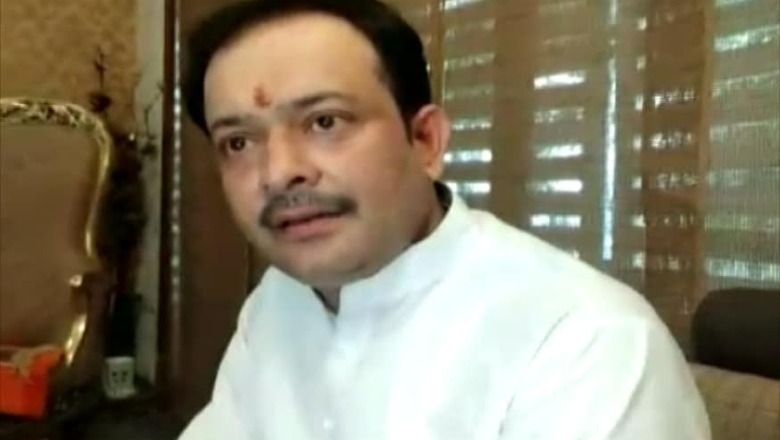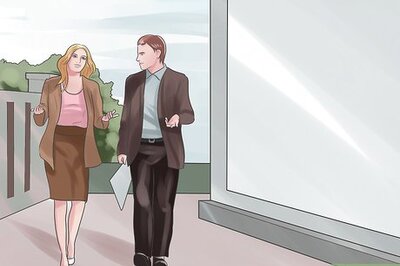
views
When a godman voluntarily calls it a day, he is expected to transcend life through 'samadhi', not shatter it by shooting himself in the temple with a licensed revolver. The supremely self-assured Bhaiyyuji Maharaj, who enjoyed vast influence, wealth, good looks and physical fitness, hardly fit the profile of a suicide risk.
Suicide by a public figure is always attended by mystery. This one is particularly baffling.
Soft-spoken, poised and impeccably groomed, he appeared immensely confident of his life's mission and his place in the world. Religion was incidental to his scheme of things. His brand of spirituality had to do with desh-bhakti. He saw himself as an ardent nationalist and social reformer. Character-building, he held, was the key to social justice and progress as a nation.
Up close, he seemed to have no vulnerabilities. Indeed, he took considerable pains to present himself as an ideal. Tall, fair and charming, with a deep, hypnotic voice and an unflappable demeanour, he was unfazed by tough questions and spoke his mind without prevarication.
He wanted to emphasise his cool, fun side and held forth on his love for high-end cars, fast and furious driving, dressing down in jeans and T-shirts, his passion for music and expertise on the guitar, fondness for all manner of sports and spending 'boy' time with his buddies late at night. He claimed to have an intellectual side, too. “Ask me anything. I can discuss any subject", he said, as if throwing down the gauntlet.
He asserted that he worked harder than he played, running a vast number of projects through his trust. He travelled extensively in Maharashtra by road, apart from frequent trips to Mumbai and Pune. In Indore, his days were spent attending functions and meeting an endless stream of devotees.
From initial reports, it appears that domestic strife had stressed him out to the point of no return. Granted, his personal life was fairly rocky. In recent years, he had lost three members of his family in quick succession – his father, mother and wife. That left him and his daughter, Kuhoo, whom he adored.
But he appeared to have bounced back, judging from the fact that he had remarried last year, to the consternation of his flock. His first marriage was hardly ideal. He had been married off at an early age, because his mother feared that he was destined for bachelorhood. His wife, Madhavi Nimbalkar, couldn't adjust to his spiritual persona and lived apart from him in Pune. The second marriage had created tension between Bhaiyyuji and his daughter. But she had lived with her mother in Pune for most of her life, so she hadn't really grown up with him.
Given his youth, appearance and predilection for macho activities like sword play and horse riding, not to mention his influence, Bhaiyyuji had a considerable female fan following. He was careful to avoid any suspicion, by keeping his interactions with women public. The caution was necessary, because a woman called Seema Wankhede had once claimed to have married him in secret and had a child by him.
Bhaiyyuji was often described as a 'political' guru, because of his vast network of political contacts. He was particularly close to Shiv Sena chief Udhav Thackeray and his son and on occasion, played mediator between politicians of rival parties. He also enjoyed a cordial relationship with Prime Minister Narendra Modi, who wrote to him when his father passed away in 2014. It was rumoured that he would visit the seer in Indore, but confined himself to sending condolences because of pressing engagements.
He first came into the public eye in 2011 when he tried to negotiate a settlement between Anna Hazare and the Union government, during the former's anti-corruption movement in Delhi. He withdrew quietly to Indore thereafter, but surfaced to attend Modi's swearing-in ceremony in 2014.
He wasn't born with a spiritual calling. He tried his hand at a variety of jobs, including engineering and modelling, before he became a seer. Bhaiyyuji styled himself as a farmer, because his family had land holdings near Indore. His personal income, he said, came from the farm. All the donations he received went into his trust, which was engaged in a bewildering variety of social work – from rehabilitating felons to cremating the homeless to teaching children the basics of the Indian Constitution.
Given that Bhaiyyuji lived his life largely in the public sphere, it's hard to believe his private troubles so traumatised him that he preferred death. A spiritual leader, one would have imagined, would be immune to an emotional implosion. He is expected to give solace, not to die from lack of it.
(The author is a senior journalist. Views expressed are personal.)




















Comments
0 comment